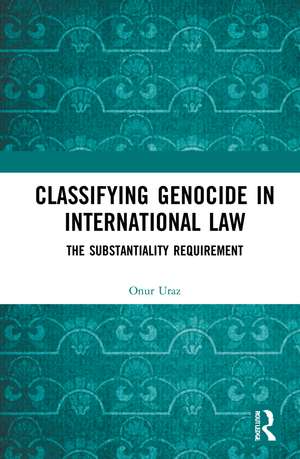Classifying Genocide in International Law: The Substantiality Requirement
Autor Onur Urazen Limba Engleză Paperback – 27 mai 2024
The book systematically explores how the individualistic and collectivistic conceptions of the crime have been able to co-exist in case law and how the different approaches to assessing substantiality have played a backdoor role between these two conceptions. The work demonstrates that these two philosophical standpoints are far from effectively representing the reality of the protected groups and fully explaining the harm inherent to group destruction. The book revisits the recent philosophical and sociological studies on the crime and, considering ideas from the emerging ‘relational approaches to genocide’, offers a third way to understand the existing legal representation of the crime and, consequently, the idea of ‘substantiality’. It demonstrates the practical significance of its theoretical debates and applies its novel perspective through a case study on South Sudan.
This book will be highly useful to students and scholars with an interest in genocide studies, international criminal law and legal theory. It will also be of interest to policymakers engaged with issues around genocide.
| Toate formatele și edițiile | Preț | Express |
|---|---|---|
| Paperback (1) | 389.66 lei 6-8 săpt. | |
| Taylor & Francis – 27 mai 2024 | 389.66 lei 6-8 săpt. | |
| Hardback (1) | 1062.98 lei 6-8 săpt. | |
| Taylor & Francis – 5 aug 2022 | 1062.98 lei 6-8 săpt. |
Preț: 389.66 lei
Nou
Puncte Express: 584
Preț estimativ în valută:
74.56€ • 78.01$ • 61.94£
74.56€ • 78.01$ • 61.94£
Carte tipărită la comandă
Livrare economică 02-16 aprilie
Preluare comenzi: 021 569.72.76
Specificații
ISBN-13: 9781032132464
ISBN-10: 1032132469
Pagini: 286
Ilustrații: 2
Dimensiuni: 156 x 234 mm
Greutate: 0.45 kg
Ediția:1
Editura: Taylor & Francis
Colecția Routledge
Locul publicării:Oxford, United Kingdom
ISBN-10: 1032132469
Pagini: 286
Ilustrații: 2
Dimensiuni: 156 x 234 mm
Greutate: 0.45 kg
Ediția:1
Editura: Taylor & Francis
Colecția Routledge
Locul publicării:Oxford, United Kingdom
Public țintă
PostgraduateCuprins
Table of Cases
Acknowledgments
Abbreviations
Chapter One – An Introduction to the Problem of the Identification and Justification of ‘Substantiality’ in Genocide Law
Chapter Two – The Emergence of the Substantiality Requirement as a De Facto Norm and its Judicial Application
Chapter Three – The Substantiality Requirement in the Legal Literature: Uncovering Binary and Substantialist Thinking
Chapter Four – Beyond Binary and Substantialist Thinking: Embracing the Contingency in the Identification and Justification of ‘Substantiality’
Chapter Five – Locating the Relevant ‘Part’ in Light of the Processual Nature of Group Destruction and the Contextuality of Genocidal Intent
Chapter Six – A Four-Step Examination for Establishing the Crime of Genocide
Chapter Seven – A Case Study: The Question of Genocide in South Sudan and the Substantiality Requirement
General Conclusion
Bibliography
Index
Acknowledgments
Abbreviations
Chapter One – An Introduction to the Problem of the Identification and Justification of ‘Substantiality’ in Genocide Law
Chapter Two – The Emergence of the Substantiality Requirement as a De Facto Norm and its Judicial Application
Chapter Three – The Substantiality Requirement in the Legal Literature: Uncovering Binary and Substantialist Thinking
Chapter Four – Beyond Binary and Substantialist Thinking: Embracing the Contingency in the Identification and Justification of ‘Substantiality’
Chapter Five – Locating the Relevant ‘Part’ in Light of the Processual Nature of Group Destruction and the Contextuality of Genocidal Intent
Chapter Six – A Four-Step Examination for Establishing the Crime of Genocide
Chapter Seven – A Case Study: The Question of Genocide in South Sudan and the Substantiality Requirement
General Conclusion
Bibliography
Index
Notă biografică
Onur Uraz is a lecturer in international law, Hacettepe Law School, University of Hacettepe, Turkey.
Descriere
This book examines genocide law by focusing on one of the lesser examined, yet practically significant, issues: the ‘substantiality requirement’. This comprehensive and detailed study draws connections between different judicial approaches to ‘substantiality’ and the varying theoretical presumptions about the constitutive concepts of the crime.
